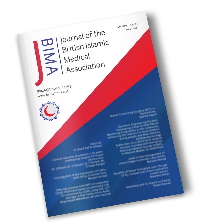
Qureshi H1 , Wiley E2, Abdul-Razakq H3 Yaqoob Z4, Javaid F5, Malik A6, Latif A7.
1GP ST3, Lincoln, ₂Microbiology Consultant, London, 3Trainee clinical scientist, Poole Hospital, Poole 4Medical student, University of Nottingham. 5Ophthalmology SHO, 6Tutor in Sociology, University of Nottingham; ₇Director of Research, Bridge Institute, London, Senior Research Fellow, School of Health Sciences, University of Nottingham.
Abstract of poster which was presented at the BIMA National Conference , Birmingham 7th December 2019
Introduction: There is currently no national policy on flexible workwear in surgical theatres for those with protected characteristics and few trusts that address this issue locally. Ali and Bowbrick (2014) suggest this may be a barrier to career progression for Muslim women at all stages of training. This study, for the first time, formally explores the experiences of Muslim women working within the theatre environment. A potential solution that meets both infection prevention and faith requirements is also presented.
Methods: A quantitative, self-completion cross-sectional survey was distributed at the ‘Muslim Women Excelling in Islam and Medicine’ conference organised by the British Medical Association (BIMA) in Spring 2016.
Results: Eight four questionnaires were returned from respondents with a mix of seniority and speciality. The majority of respondents reported wearing the headscarf (94%) and cited this was considered important to their religious beliefs. Despite 91% reporting their religious requirements were respected by the theatre manager, 55% felt their religious requirements were met by local policy and were happy with the policy. 52% had experienced problems when trying to wear a headscarf with 32% reporting avoiding theatre because of concerns e.g embarrassment (23%) anxiety (37%) or bullying (37%); 14% indicated this had an impact on their career choice.
The survey also assessed the feasibility of a prototype ‘single use disposable theatre hijab’ that aimed to cover the head and neck. 99% agreed that this was a feasible option.
Conclusions: Trust uniform policies need provide more detailed guidance in order to meet legal, faith and infection prevention requirements in theatres. Muslim female healthcare workers must be encouraged to report to their Trusts when feeling marginalised. Trusts should be encouraged to review theatre dress code policies and develop feasible solutions. A disposable theatre garment innovated by this research team could be a workable alternative.

